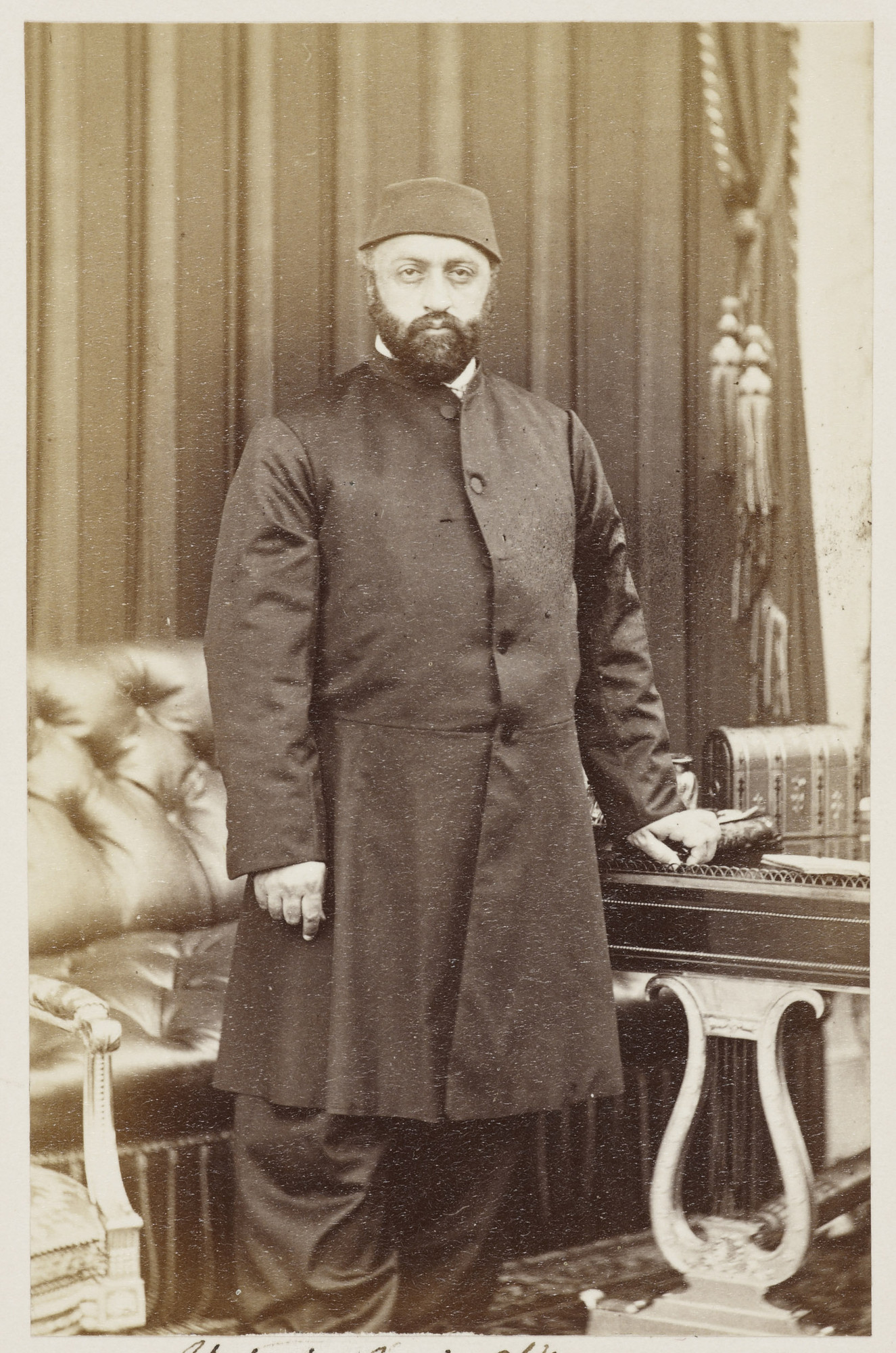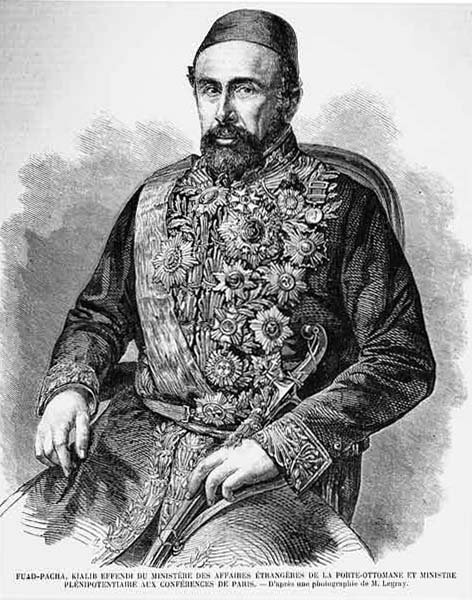|
Supreme Council Of Judicial Ordinances
The Supreme Council of Judicial Ordinances (or the Grand Council of Justice, Turkish: ''Meclis-i Vâlâ-yı Ahkâm-ı Adliye'', also known as ''Meclis-i Vâlâ'') was a legislative and judicial body of the Ottoman Empire the Tanzimat period, serving as the equivalent of a Court of Cassation, Court of Appeals, and a Council of State. The council was indeed split into these institutions upon its dissolution. Established in the later end of Mahmud II's reign, it was at first mandated to give opinions and recommendations on legislation drawn up from other parts of the government, but was soon given the sole authority to draft its own laws, regulations, and legislation during the Tanzimat era. The Supreme Council's rules included a parliamentary procedure that gave the right to free speech for all its members in orderly discussion. It was the first institution of the central government to include non-Muslims. The Supreme Council of Judicial Ordinances' purpose was to create an "orde ... [...More Info...] [...Related Items...] OR: [Wikipedia] [Google] [Baidu] |
Council Of State (Ottoman Empire)
The Council of State (Ottoman Turkish: ''Şûrâ-yı Devlet'', شوراى دولت) was the high legislative institution in the Ottoman Empire that corresponds to the present-day Council of State of Turkey. It served between the years 1868 and 1922. Early formation The foundations of ''Şûrâ-yı Devlet'' can be traced back to the Supreme Council of Judicial Ordinances, established by Sultan Mahmud II in 1837. This court laid the groundwork for the current Council of State and the Court of Cassation (''Yargıtay''). In 1839, with the Edict of Gülhane, the Ottoman people were promised the guarantee of their natural rights, such as life, property, honor, and dignity, regardless of religion or sect. This marked the establishment of the principles of a new legal state, emphasizing the necessity for the administration (state) to adhere to legal rules. Division In 1868, during the reign of Sultan Abdulaziz, the Supreme Council of Judicial Ordinances was divided into two insti ... [...More Info...] [...Related Items...] OR: [Wikipedia] [Google] [Baidu] |
Muslim Millet
Sunni Islam was the official religion of the Ottoman Empire. The highest position in Islam, ''caliphate'', was claimed by the sultan, after the defeat of the Mamluks which was established as Ottoman Caliphate. The sultan was to be a devout Muslim and was given the literal authority of the caliph. Additionally, Sunni clerics had tremendous influence over government and their authority was central to the regulation of the economy. Despite all this, the sultan also had a right to the decree, enforcing a code called Kanun (law) in Turkish. Additionally, there was a supreme clerical position called the Sheykhulislam ("Sheykh of Islam" in Arabic). Minorities, particularly Christians and Jews but also some others, were mandated to pay the jizya, the poll tax as mandated by traditional Islam. Governance Before the Tanzimat, the ruling institution, also known as the Muslim millet, was known as the ''Bab-ı Meşihat'', the office of the Sheykhulislam. Other names used were the ''Bâb-� ... [...More Info...] [...Related Items...] OR: [Wikipedia] [Google] [Baidu] |
Abdulaziz
Abdulaziz (; ; 8 February 18304 June 1876) was the sultan of the Ottoman Empire from 25 June 1861 to 30 May 1876, when he was overthrown in a government coup. He was a son of Sultan Mahmud II and succeeded his brother Abdulmejid I in 1861. Abdulaziz's reign began during the Ottoman Empire's resurgence following the Crimean War and two decades of the Tanzimat reforms, though it was still reliant on European capital. The decade after his accession was dominated by the duo of Fuad Pasha and Aali Pasha, who accelerated reorganization of the Empire. The Vilayet Law was promulgated, Western codes were applied to more aspects of Ottoman law, and the millets were restructured. The issue of Tanzimat dualism continued to plague the empire, however. He was the first Ottoman sultan who traveled to Western Europe in a diplomatic capacity, visiting a number of important European capitals including Paris, London, and Vienna in the summer of 1867. With Fuad and Aali dead by 1871, Abdul Az ... [...More Info...] [...Related Items...] OR: [Wikipedia] [Google] [Baidu] |
History Of The Jews In The Ottoman Empire
By the time the Ottoman Empire rose to power in the 14th and 15th centuries, there had been Jewish communities established throughout the region. The Ottoman Empire lasted from the early 12th century until the end of World War I and covered parts of Southeastern Europe, Anatolia, and much of the Middle East. The experience of Jews in the Ottoman Empire is particularly significant because the region "provided a principal place of refuge for Jews driven out of Western Europe by massacres and persecution." At the time of the Ottoman conquests, Anatolia had already been home to communities of Byzantine Jews. The Ottoman Empire became a safe haven for Jews from the Iberian Peninsula fleeing persecution (see Alhambra Decree). By the end of the 16th century, the Ottoman Empire had the largest Jewish population in the world, with 150,000 compared to Poland's and non-Ottoman Ukraine's combined figure of 75,000. The First and Second Aliyah brought an increased Jewish presence to Ottoma ... [...More Info...] [...Related Items...] OR: [Wikipedia] [Google] [Baidu] |
Catholicism In Armenia
The 2011 census counted 13,843 Catholics in Armenia, representing about 0.46% of the total population. Catholics in Armenia belong to two particular churches, the Latin Church (which includes the vast majority of Catholics worldwide) and the Armenian Catholic Church. Territorial jurisdictions and dioceses Catholics in Armenia are divided into two separate territorial jurisdictions. Latin Rite Catholics are part of an Apostolic Administration, the Apostolic Administration of the Caucasus, and Armenian Rite Catholics belonging to the Armenian Catholic Church are part of an ordinariate for the faithful of eastern rite, the Ordinariate for Catholics of Armenian Rite in Eastern Europe, which also includes Armenian Catholic Church members in Eastern Europe. Within Armenia The Catholics have always lived somewhat separate from the communities of Armenian Apostolic Church (an Oriental Orthodox Church that includes most Armenians as members), and intermarriage is not very common. Some ... [...More Info...] [...Related Items...] OR: [Wikipedia] [Google] [Baidu] |
Armenian Millet
The Armenian millet (, ''Millet-i Ermeniyân'') or the Armenian Gregorian Millet was the Ottoman millet (autonomous ethnoreligious community) of the Armenian Apostolic Church. It initially included not just Armenians in the Ottoman Empire but members of other Oriental Orthodox and Nestorian churches including the Coptic Church, Chaldean Catholic Church, Ethiopian Orthodox Tewahedo Church, Syriac Orthodox Church, and the Assyrian Church of the East, although most of these groups obtained their own millet in the nineteenth century. The Armenian Catholic and Armenian Protestants also obtained their own millets in 1831 and 1850 respectively. Mehmet II separated the Armenian millet from the Greek Orthodox millet because of the disagreements that they had over orthodoxy. By establishing a new Armenian Patriarchate in Constantinople, members of the millet were not only able to handle things autonomously, they had the legal status to bring a case to the Islamic courts. The Armenian mill ... [...More Info...] [...Related Items...] OR: [Wikipedia] [Google] [Baidu] |
Ohannes Dadian
The Dadian family was an Ottoman Armenian family that was famous for their industrial activities within the Ottoman Empire. Besides being prominent factory owners (the family had a monopoly on the empire's gunpowder Gunpowder, also commonly known as black powder to distinguish it from modern smokeless powder, is the earliest known chemical explosive. It consists of a mixture of sulfur, charcoal (which is mostly carbon), and potassium nitrate, potassium ni ... industry for more than a century), members of the family also served as political advisers. The Dadians were also well acquainted with Ottoman banking. Ohannes Dadian was the director of the gunpowder factory in 1845. References Armenian families Armenians from the Ottoman Empire Families from the Ottoman Empire {{Ottoman-stub ... [...More Info...] [...Related Items...] OR: [Wikipedia] [Google] [Baidu] |
1856 Imperial Reform Edict
The Imperial Reform Edict (, ''Islâhat Hatt-ı Hümâyûnu''; Modern ) was a February 18, 1856 edict of the Ottoman government and part of the Tanzimat reforms. The decree from Ottoman Sultan Abdulmejid I promised equality in education, government appointments, and administration of justice to all regardless of creed. The decree is often seen as a result of the influence of France and Britain, which assisted the Ottoman Empire against the Russians during the Crimean War (1853–1856) and the Treaty of Paris (1856) which ended the war. Hatt-ı Hümayun was a promise by the Sultan to his citizens, subjects. The Sultan promised to be held responsible for the constitution of the "Provincial Councils" and "Communal Councils" and the fairness of this process and the results. In matters concerning all the subjects of the State (related with Hatt-ı Hümayun), the spiritual leader of every congregation, along with its official appointed for one year by the government, will participat ... [...More Info...] [...Related Items...] OR: [Wikipedia] [Google] [Baidu] |
Stanford Shaw
Stanford Jay Shaw (5 May 1930 – 16 December 2006) was an American historian, best known for his works on the late Ottoman Empire, Turkish Jews, and the early Turkish Republic. Shaw's works have been criticized for denial of the Armenian genocide, and other pro-Turkish bias. Biography Stanford Jay Shaw was born to Belle and Albert Shaw, who had immigrated to St. Paul from England and Russia respectively in the early years of the twentieth century.Profile of Prof. Shaw . . Accessed 9 June 2011. He was of Jewish heritage. Stanford Shaw and his parents moved to |
Supreme Council Of Reorganization
Supreme may refer to: Entertainment * Supreme (character), a comic book superhero created by Rob Liefeld * ''Supreme'' (film), a 2016 Telugu film * Supreme (producer), hip-hop record producer * "Supreme" (song), a 2000 song by Robbie Williams * The Supremes, Motown-era singer group * Supreme Pictures Corporation, 1930s film company Other * Supreme (brand), a clothing brand based in New York * Supreme (cookery), a term used in cookery * Supreme, Louisiana, a census-designated place in the United States * Supreme Soviet, the highest legislation body of Soviet Union, dissolved in 1991 * Oldsmobile Cutlass Supreme, car produced by Oldsmobile between 1966 and 1997 * Plaxton Supreme, British coach bodywork built in the late 1970s and early 1980s See also * Supreme Records (other), several record labels * Supremo (other) * Supreme court * Supremacy (other) Supremacy may refer to: Arts, entertainment, and media Gaming * ''Supremacy'' (board game), a 198 ... [...More Info...] [...Related Items...] OR: [Wikipedia] [Google] [Baidu] |
Mehmed Fuad Pasha
Mehmed Fuad Pasha (1814 – February 12, 1869), sometimes known as Keçecizade Mehmed Fuad Pasha and commonly known as Fuad Pasha, was an Ottoman administrator and statesman, who is known for his prominent role in the Tanzimat reforms of the mid-19th-century Ottoman Empire, as well as his leadership during the 1860 Mount Lebanon civil war in Syria. He represented a modern Ottoman era, given his openness to European-style modernization as well as the reforms he helped to enact. Among other posts, he served as Grand Vizier, the equivalent of Prime Minister, on two occasions between 1861 and 1866. He is often regarded, along with Mehmed Emin Âli Pasha, as one of the most influential Ottoman statesmen, who favoured a French-inspired civil code for the newly established civil courts in 1868. Fuad Pasha was a fervent supporter of keeping the empire an absolute monarchy, rejecting the ideas of being legally bounded or restricted by a constitution or legislature. He often clashed w ... [...More Info...] [...Related Items...] OR: [Wikipedia] [Google] [Baidu] |



